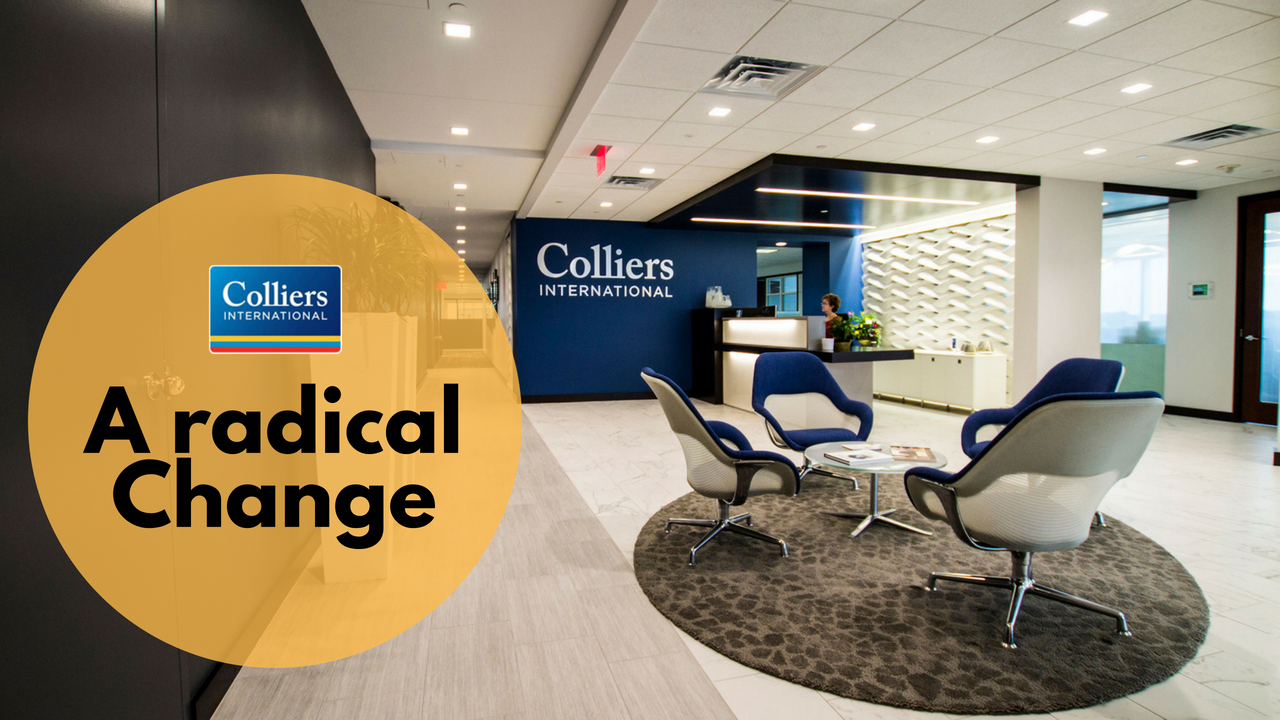- Real estate firm Colliers International has entered the flexible workspace market
- The company appointed Mark Bott as head of serviced offices, a new role focusing on coworking and flexible office requirements
- In an interview with Allwork.Space, Bott explained that businesses are becoming more agile and employee-centric, which is driving demand for flexible space
Colliers International, one of the world’s largest commercial real estate firms, has launched a new service focused specifically on coworking, flexible and serviced office spaces.
Leading the brand’s foray into the market is Mark Bott, Head of Serviced Offices at Colliers, who stepped into the new role last month.
“There is huge demand for flexible space,” Bott explained in an interview with Allwork.Space. “It’s coming from all types of businesses and I’m working with a broad range of clients, from SMEs to corporates and mid-cap companies.”
Colliers is entering the flexible space sector at a time when the global coworking market is experiencing annual growth of 16.1% and the number of people using coworking is rising by 24.2% every year, according to Emergent Research and GCUC.
“There’s certainly a shift in the market,” said Bott, who is based in London and is currently focusing on the UK market with a view to expanding the new service internationally.
He has seen first-hand the growth in demand and significant change in perspective towards flexible space, having formerly worked at the Instant Group and Search Office Space (which has since re-branded from SOS to Office Freedom).
He notes that technology is a major driver behind this transformation, and tech firms themselves are driving demand for flexible space as they become increasingly agile.
“Technology is the oxygen of business,” says Bott. “One of the biggest changes we’re seeing is that tech companies don’t need a big HQ presence or a name over the door. They want to be more agile and preserve capital so they can employ more staff, and flexible space gives them the ability to shrink and grow as needed.”
But it is also a change in attitude towards the way businesses use and interact with their space, and this shift in thinking is largely influenced by major events. Lifestyle, the advent of wireless technology, changes in working habits, economic factors and even political matters. Currently in the UK, demand for flexible space is accelerating in the run-up to Brexit as companies delay long-term workplace decisions.
“Brexit makes it difficult for businesses to forecast over long periods of time,” Bott added.
“But even if you remove Brexit, flexible space is still very relevant to companies today. They need to be agile and dynamic, and they recognise that flexible space can enable them to be more adaptable to market conditions.”
Those companies that are actively seeking to build more flexibility into their workplace are typically focused on employee wellbeing.
“It’s a huge factor for them. They’re using their workplace as a way to attract and retain talent; they’re no longer satisfied with blue carpet with white walls. They want good design and they’re asking for space with specific amenities – gyms, bike racks, showers and cafes. It’s like a Google effect. They want the social aspect, the community melting pot.
“Spaces and The Office Group do this fantastically well – they have lots of amenities on-site with great design and collaborative space.”
Similarly, Bott is working with large occupiers who are keen to use flexible space to “tap into the engagement of coworking” while still maintaining their own private space.
“Long-term we may see more hub-and-spoke models, as companies seek to reduce their footprint and improve efficiency by bringing in a flexible offering, and adding ‘spoke’ project space around a core location.
“Our service is client driven and we’re seeing so many ways in which companies are using flexible space, particularly those who are experiencing rapid growth,” added Bott. “It helps companies overcome barriers to growth by protecting capital and removing the risk of long-term leases. It’s certainly here to stay.”



 Dr. Gleb Tsipursky – The Office Whisperer
Dr. Gleb Tsipursky – The Office Whisperer Nirit Cohen – WorkFutures
Nirit Cohen – WorkFutures Angela Howard – Culture Expert
Angela Howard – Culture Expert Drew Jones – Design & Innovation
Drew Jones – Design & Innovation Jonathan Price – CRE & Flex Expert
Jonathan Price – CRE & Flex Expert












